Photo
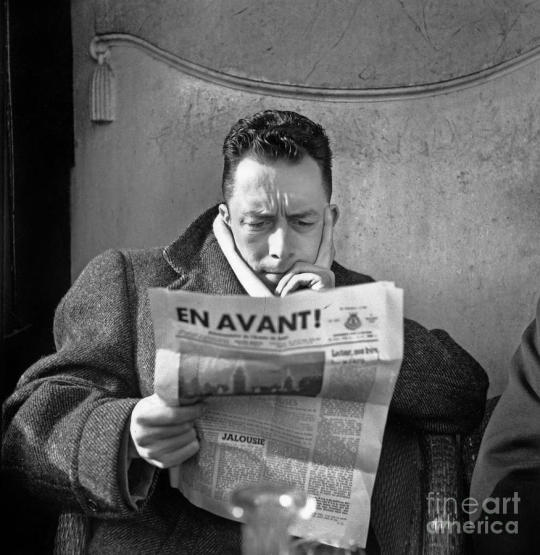
Legacy
As novelist and playwright, moralist and political theorist, Albert Camus after World War II became the spokesman of his own generation and the mentor of the next, not only in France but also in Europe and eventually the world. His writings, which addressed themselves mainly to the isolation of man in an alien universe, the estrangement of the individual from himself, the problem of evil, and the pressing finality of death, accurately reflected the alienation and disillusionment of the postwar intellectual. He is remembered, with Sartre, as a leading practitioner of the existential novel. Though he understood the nihilism of many of his contemporaries, Camus also argued the necessity of defending such values as truth, moderation, and justice. In his last works he sketched the outlines of a liberal humanism that rejected the dogmatic aspects of both Christianity and Marxism.
On a purely literary level, one of Camus’s most original contributions to modern discourse is his distinctive prose style. Terse and hard-boiled, yet at the same time lyrical, and indeed capable of great, soaring flights of emotion and feeling, Camus’s style represents a deliberate attempt on his part to wed the famous clarity, elegance, and dry precision of the French philosophical tradition with the more sonorous and opulent manner of 19th century Romantic fiction. The result is something like a cross between Hemingway (a Camus favorite) and Melville (another favorite) or between Diderot and Hugo. For the most part when we read Camus we encounter the plain syntax, simple vocabulary, and biting aphorism typical of modern theatre or noir detective fiction. By the way it’s worth noting that Camus was a fan of the novels of Dashiell Hammett and James M Cain and that his own work has influenced the style and the existentialist loner heroes of a succession of later crime writers, including John D McDonald and Lee Child. This muted, laconic style frequently becomes a counterpoint or springboard for extended musings and lavish descriptions almost in the manner of Proust. Moreover, this base style frequently becomes a counterpoint or springboard for extended musings and lavish descriptions almost in the manner of Proust. Here we may note that this attempted reconciliation or union of opposing styles is not just an aesthetic gesture on the author’s part: It is also a moral and political statement. It says, in effect, that the life of reason and the life of feeling need not be opposed; that intellect and passion can, and should, operate together.
Perhaps the greatest inspiration and example that Camus provides for contemporary readers is the lesson that it is still possible for a serious thinker to face the modern world (with a full understanding of its contradictions, injustices, brutal flaws, and absurdities) with hardly a grain of hope, yet utterly without cynicism. To read Camus is to find words like justice, freedom, humanity, and dignity used plainly and openly, without apology or embarrassment, and without the pained or derisive facial expressions or invisible quotation marks that almost automatically accompany those terms in public discourse today.
95 notes
·
View notes
Photo

https://unherd.com/2018/09/camus-rejection-tyranny-worth-remembering-today/
https://quillette.com/2019/03/26/albert-camus-unfashionable-anti-totalitarian/
Camus fell out with his fellow Leftist intellectual Jean-Paul Sartre in 1952 over the latter’s acceptance of state terror as an acceptable price to pay in the name of the Communist ideal. In his 1947 novel The Plague, Camus mocked those who, like Sartre, justified the concept of the ‘necessary murder’ for political ends.
But Camus’ contribution to anti-totalitarian thought extends beyond the internecine squabbles of the 20th-century Left. His embryonic theoretical approach, which led to his rejection of totalitarianism, is discernible in his early writings on suicide, and these have as much value today as when they were first written. The appetite in life for resolution, unity, and for an absolute reconciliation of life’s various chaotic threads, drives a person inexorably toward one of several conclusions. He or she may attempt to escape altogether from existential anxiety through death, or else by dedicating his or her life to hopes that are projected on to the future (by embracing religion or the urge to embody life with a higher purpose).
Embracing the absurd needn’t lead to resignation and depression, however. Camus cannot accept that “refusing to grant a meaning to life necessarily leads to declaring that it is not worth living”. Instead, he urges readers to enjoy the beauty, texture and ambiguity that ordinary life has to offer, despite its essential meaninglessness. Orwell was aiming at something similar – albeit in a far less theoretical way – in his literary focus on the beauty of “solid things” and small worlds: the art of Donald McGill, the local pub, English cooking.
We still have much to learn from Camus. This may seem a surprising claim because the movements Camus opposed offered a universal and unifying project in Marxism, while much of our contemporary politics is committed to endless division. Postmodernism and the political philosophies derived from social constructionism, tell us that our increasingly narrowly defined groups determine our interests and our knowledge. But Camus’s appeal to our shared humanity—something that remains a
s unfashionable on the Left today as it was in his lifetime—is antithetical to these ideologies also. If Camus is correct, then a politics based on these ideologies must fail, since moral progress depends upon revolt, and just revolt begins with the recognition, and the assertion, of our shared human nature. As Camus put it, a just act of revolt “grounds its first value on the whole human race.” And so the rebel cries out, “I revolt—therefore we exist.” This is a cry not only against inequality, but also against division.
2 notes
·
View notes
Text
http://www.inquiriesjournal.com/articles/1639/does-essence-precede-existence-a-look-at-camuss-metaphysical-rebellion
Albert Camus lived during a tumultuous time that included his experience of World War II and the Algerian War. Camus is most prominently known as an author of fine French literature but he was also a philosopher. While it is debatable whether Camus was an existentialist, a label he personally disliked, his analysis of rebellion in his work The Rebel serves as a relevant argument for the establishment of an ethic based on metaphysical rebellion. Camus faced and was witness to great oppression throughout his lifetime so it is no surprise that he wrote about rebellion. Camus was personally part of the rebellion of the Nazis in World War II and he also spoke out against Muslim oppression he had witnessed in his home country of Algeria. Camus formed his concept of metaphysical rebellion as a way to formulate an ethic in the face of a world that Camus described as absurd. Several authors and philosophers, like Marquis de Sade and Nietzsche, have responded to the absurd in their own way but Camus's response to the absurdity of the human condition is an evolution from the responses of those other two thinkers. While Camus constructs his ethic of rebellion he clings to a concept of human essence that not only put him at odds with existentialists like Sartre, but his idea of human essence is also unnecessary for the establishment of his ethic. Camus's metaphysical rebellion is a successful argument for the creation of a code of conduct for ethical behavior, and one that remains relevant in the world today. Rebellion is not only valuable in the past or in third-world countries; issues like slavery, women’s suffrage, ongoing conflicts in the Middle East are all examples of the need to cherish the human ability for rebellion.
1 note
·
View note
Text
During the Modernism period Albert Camus wrote “The Guest.” Albert Camus is known as the great “moralist” of French literature in the twentieth-century. Even though he was a great writer, he is most widely known for his first pictures of humans struggling to understand themselves and the reason they live in the environment they live in. The consciousness of the “absurd” and the subsequent voluntary “engagement” or devotion to liberty and justice “as if” the world made sense are the two elements that complement each other in Camus’ moral vision. He dealt with the isolation and fragmentation of the modern times. He mainly used a certain social issue and political revolution to help give him a spark to his ideas on what he should write about. In his story “The Guest” I seen that isolation was used. As Balducci left the Arab there for Daru to take to Tinguit, Daru got to thinking about it. Even as soon as Balducci told him he was in the plans to take the Arab he did not want that job. Daru wanted to be left out of this delivery. The Arab thought that Daru was a different, but crazy man. The Arab found it odd that Daru would sit to eat with him or make him a place to sleep next to him in his room. The Arab is used to being drug behind a horse and not have a white man eat with him. Daru was calm with the Arab, not completely trusting him though. As night came to morning it was time to take the Arab to Tinguit. But instead of Daru taking him there he took him out into the plateau and gave him a package. Which consisted of dates, bread, and sugar that should last him for two days. He also gave him a thousand francs too, and told him to go to the east and that would take him to where he needs to go. Daru did this because he did not want to be apart of the delivering of the Arab. So if Daru were to leave him there and walk away the man would be no more to him. And if he ran away it would not be Daru’s problem, though it seems he is trying to help the Arab run away. As Daru started walking back toward the schoolhouse the Arab just stood there alone. Soon when Daru looked back he seen the Arab heading toward the east, in which the direction of the prison was in Tinguit. Daru then went back to the schoolhouse where he sat alone again.
Daru taking this action to not walk the Arab to the city of Tinguit, he was not finishing his end of the deal. Therefore, making this story an isolated story. Isolation is a national policy of nonparticipation of international affairs. Just as Camus feels, Daru feels the poignant loneliness of being caught between two cultures. Because Daru wanted to do what Balducci said to do, but at the same time this Arab had done nothing to him. And he did not want to take him to the city, so he let him go into the city by himself. Its not like Balducci would ever know the truth or not.
1 note
·
View note
Photo
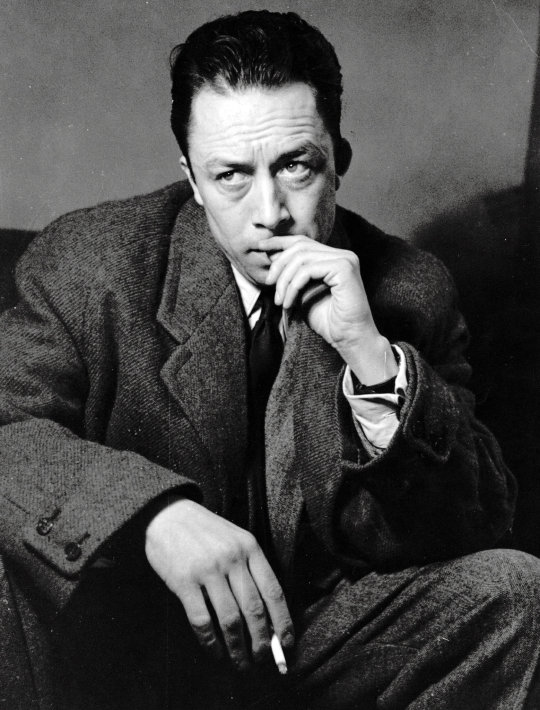
A child of despairing modernity, Albert Camus accepts that all our lives are absurd in the grander scheme, but – unlike some philosophers – he ends up resisting utter hopelessness or nihilism. He argues that we have to live with the knowledge that our efforts will be largely futile, our lives soon forgotten and our species irredeemably corrupt and violent – and yet should endure nevertheless. Absurdism was Camus’ answer to nihilism. Similarly to nihilists, absurdists believe that people should avoid the fact that life is meaningless and try to find a meaning in order to survive.
3 notes
·
View notes
Photo


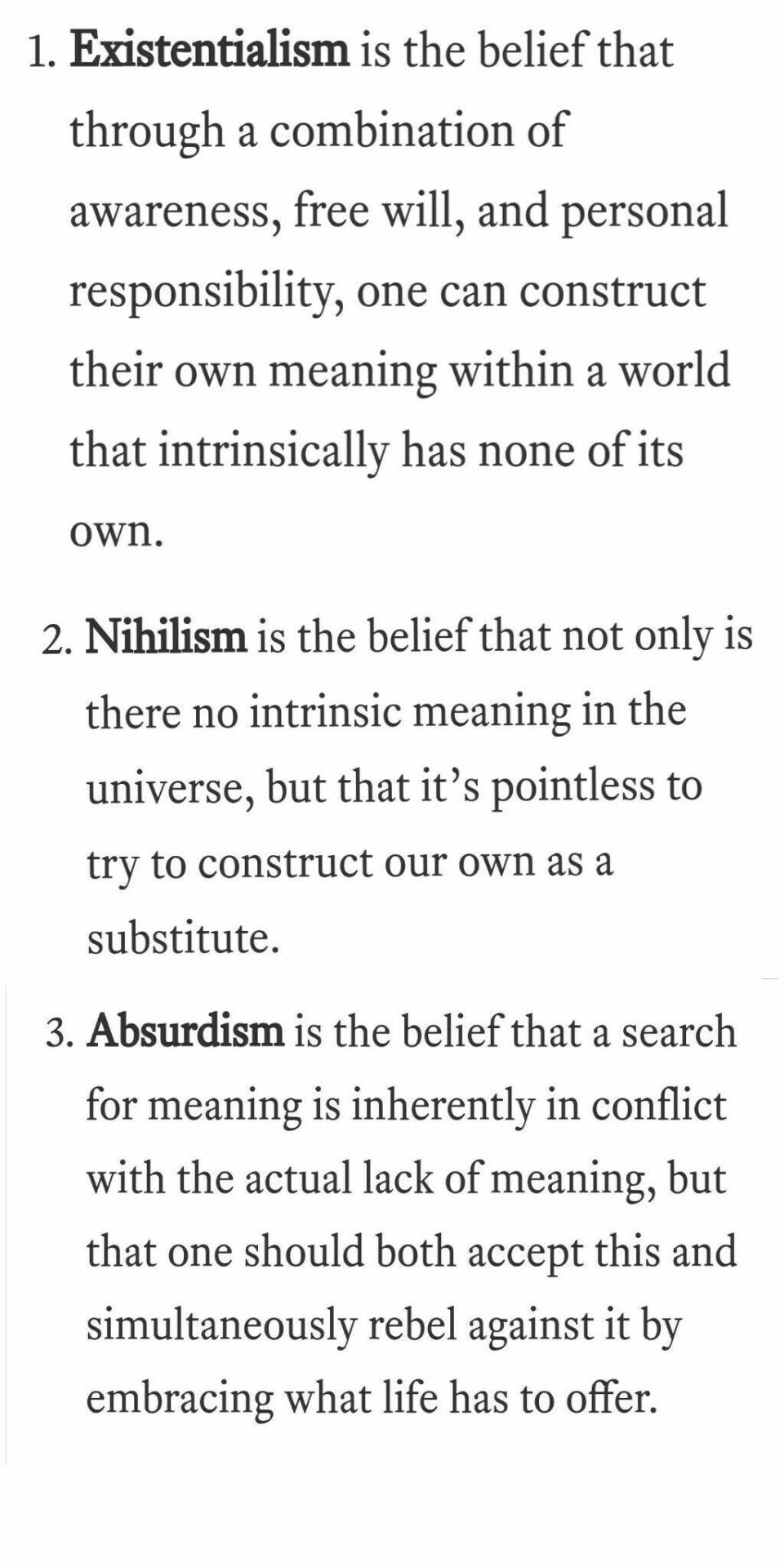
Comparisons between existentialism, nihilism, and absurdism
35 notes
·
View notes
Photo

Absurdism and existentialism
If you've ever been punished for something you didn't do, then you'll probably appreciate the irony present in ''The Guest'' by Albert Camus. The story exemplifies Camus' perspective on absurdism, especially concerning the meaning of one's existence. Absurdism refers to the philosophical search for meaning and the inability to find any. In the case of ''The Guest'', a schoolmaster who is reluctant to pick sides during a conflict finds himself in a precarious position because of his lack of action; this is the ironic part of the story. While the setting is significant, the presence of irony is striking, especially at the end.
The Guest is characteristic of existentialism, the prevalent school of thought among the era's literature. It also presents Camus' concept of absurdism, as well as many examples of human choices. The dilemmas faced by Daru are often seen as representing the dilemmas faced by Camus regarding the Algerian crisis and there are many similarities between the character of Daru and his creator Camus. Both are French Algerians exiled by the choices they have made. The main themes of "The Guest" are of choice and accountability. Camus emphasizes, characteristically of existentialist philosophy, that there is always a choice, that the only choice unavailable is not to choose. Daru chooses how he will handle Balducci and whether he will turn in the prisoner; the prisoner chooses whether to go to jail or to freedom. More important, however, is the theme of accountability. The essence of Camus's philosophy is that everyone is "condemned" to an eventual, inevitable death, and accepting this allows for a certain freedom; the prisoner, having achieved self-awareness when Daru gave him the choice to flee or go to jail, realizes the futility of fleeing from the inevitable punishment and goes willingly to jail, thus revolting against the inevitable by making the decision of his own accord and holding himself accountable for the murder.
Daru's choice can also be seen as a "damned-if-you-do, damned-if-you-don't" situation. Daru makes his decision based on what he believes to be the right thing to do. The fact that he will be punished for doing the right thing does not make it any less right. The important point is that people must do what they feel is right, without worrying about how others feel, or about possible rewards or punishments.
Yet another theme can be extracted from this short story, however: complete neutrality is unattainable. This is evidenced by Daru's attempt to avoid making a decision; in the end, the Arab makes the decision for him, and he loses his neutrality.
20 notes
·
View notes
Photo
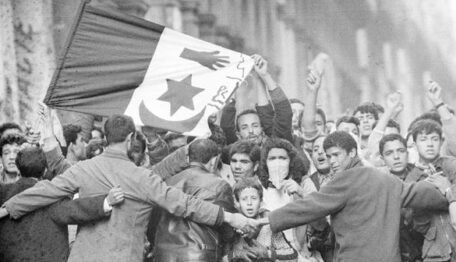
Context
''The Guest'' is set during the period of conflict in French-colonized Algeria, which ranged between 1954 to 1962. Daru, the schoolmaster, lives in the nearby schoolhouse that serves the poor families in a mountainous region. To the south is the desert. East, where Daru is expected to transport the prisoner, is Tinguit. The region has suffered a tremendous drought, and without warning or the typical rainy season, a severe blizzard has blanketed the slopes leading up to the schoolhouse.
Because of Camus' indelible connection to his homeland, which serves as the foundations of "The Guest," the short story is often thought to reflect Camus' own revolutionary experiences during the period in which it was written. In 1956, during a time in which the Algerians were increasing their struggle against French colonialism, Camus, for the first time in fourteen years, returned to Algeria in an attempt to broker peace between the two places that he called home. There, fragments of right-wing French settlers called for his assassination, while unseen Algerian revolutionaries spied on his daily movements. Through these experiences, one can examine how the escalating violence between these two forces, with civilian casualties becoming the most common occurrence, displayed Camus' sense of individual freedom that is ultimately reflected in his work.
Although Camus considered himself to be French, he did not settle in France until he was already an established author. Instead, he grew up in French Algeria as a Pied-Noir, or a black foot—a Frenchman born in the colony to a lower-class family. This put him in the unique position of being below the les colons, or the ruling class, but also above the native population of Arabs and Berbers. As a journalist in Kabylie, Camus saw the Berbers suffer from a prolonged drought and the lack of interest exhibited by the metropolitan French toward their plight. In "The Guest," Daru is also witness to the effects of a lengthy drought and seems to understand the consequences of the indifference shown by the French.
Among the last of Camus' finished works, "The Guest" was written during the Algerian War of Independence, which lasted between 1954 and 1962, a full two years after his death, and, much like Daru, encapsulates Camus' own conflicted feelings toward the conflict itself, which left him feeling isolated and detached. Although Camus sympathized with the indigenous Algerians, he also believed that the conflict was increasing the divide between the Arabs and working-class Europeans. While many were focused on choosing a side in the conflict, Camus saw both the Arabs and the colonials as victims, united in their suffering as well as in their love for their homeland. This closely parallels Daru's journey throughout the story, suggesting that Camus was drawing heavily from his own experience as an outsider.
Literary scholars have suggested that Camus, through his portrayal of the Arab prisoner, who is depicted as being "rather stupid, and even slightly bestial," believed that indigenous peoples were unprepared for the freedom they sought. In his own political writings, such as his Algerian Chronicles, Camus even seems to suggest that a confederation made up of France and its former colonies would be the ideal, rather than letting Algeria go entirely independent, largely because he feared that the lower-class settlers would suffer as a result of this change. His fears were not entirely unfounded, as over one million pieds-noirs were forced to flee Algeria for France after Algeria was ultimately granted its independence in 1962. However, the willingness for torture and violence shown by the French military in their efforts to maintain control over a rapidly destabilizing empire unnerved and horrified Camus to the point that he could not bring himself to side with French either.
0 notes
Photo

“The Guest”is a short story by the French writer Albert Camus. It first appeared in the 1957 collection, Exile and the Kingdom. Interestingly, the French title of the story, L'Hôte, can be translated as both “the guest” and “the host,”which play on the roles of the main characters of the story. This story is particularly reflective of existentialism, which was a very significant school of thought at the time of publication. It also presents the concept of absurdism, the philosophy that states any human attempt to find meaning or inherent value in life will fail because ultimately there is no such thing. Camus was an early contributor to the relatively new philosophy, as demonstrated in The Guest. Another significant theme is human choice—choices made and accountability for them. The short story is thought to reflect several revolutionary moments during the era that it was written. The 2014 film, Far From Men, starring Viggo Mortensen, is based on the story.
Daru is a schoolmaster in Algeria. He is watching two men approach the school on a rocky slope, one of them riding a horse and the other walking behind him. He deduces that the two men will reach where he stands within thirty minutes. Daru’s living quarters, the only small room that remains heated in these empty winter months, are in the school. A long drought has just passed, followed by alarge snowfall. As he warms up in his room, he realises he can no longer see the men. They have begun to ascend the next hill, hidden from Daru’s view. He thinks today’s weather is better than the past three days of blizzards.
In the school there are bags of wheat that Daru administers to the children each day, but since the school closed he thinks their older siblings might show up to claim their rations. The wheat arrives from France, and is vital to the families’ livelihoods. The draught killed sheep and men alike, although Daru felt like a lord with his meager accommodations.
The two men are halfway up the slop; the one on the horse is an old gendarme Daru knows, named Balducci. The other is an Arab, with tied hands. Daru watches them arrive, particularly interested in the Arab. Balducci greets the schoolmaster, talking of how long the trip from El Ameur took.
Inside the schoolhouse, the three men sit in a classroom, which Daru has decided to heat. The Arab with still-bound hands crouches near the stove, and Balducci sits on the couch. Daru thinks the Arab looks rebellious. Daru brings mint tea and unties the Arab, who drinks feverishly. Balducci says Daru has been given orders to deliver the prisoner to Tinguit. The prisoner has killed his own cousin. The two discuss the possibility of a rebellion, and as Balducci leaves he gives Daru a gun to protect himself from the Arab. Daru says he does not plan to hand over the Arab. Daru believes this is his duty. Balducci says he will not tell anyone, and asks Daru to sign the paper anyway. Daru leaves the Arab alone in the classroom and returns to his room.
Daru thinks neither he nor the prisoner matter, but they donot belong anywhere else. He returns to the classroom and makes dinner for both of them, and after that he gives the Arab a bed to sleep in. The Arab will not answer Daru’s questions about the murder; he wants to know what they will do to him, whether the gendarme is coming back. Daru has no answers for him.
Daru has difficultt sleeping, torn between loyalties. He thinks he hears the Arab sneak out, and is relieved, but soon he returns again.
In the morning, they eat breakfast, and Daru cleans the room. He thinks of his actions, which insulted Balducci. Daru is angry at the Arab for his crimes, but cannot bring himself to turn him into the authorities, which would be a dishonourable act. The two men dress, Daru packs them food, and they leave the schoolhouse, moving east. Eventually he hands the food to the Arab, along with two thousand francs. The prisoner does not seem to understand. East, Daru points, is the direction of Tinguit. South, he again points, there is a path across the plateau, after which he will find pasturelands and nomads who will shelter him. The Arab is in a panic, but Daru will not listen. He heads back, and when he looks back, the Arab has disappeared. After some hesitation, Daru returns to the spot, and in the distance sees the man heading east, to turn himself in.
When Daru returns to the schoolhouse, there is a message written on the backboard: “You have handed over our brother. You will pay for this.” It is unclear who wrote the note, but it signifies Daru’s constant moral dilemma.
15 notes
·
View notes
Photo
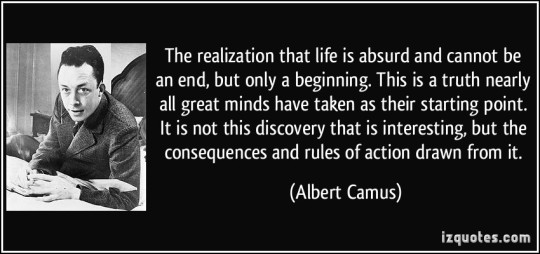
Camus’ literary work is regarded as a primary source of modern existentialist thought. A principal theme in Camus' novels is the idea that human life is, objectively speaking, meaningless. This results in absurdity which can only be overcome by a commitment to moral integrity and social solidarity. Although perhaps not a philosopher in the strictest sense, his philosophy is widely expressed in his novels and he is generally regarded as an existentialist philosopher. According to Camus, the absurd is produced via conflict, a conflict between our expectation of a rational, just universe and the actual universe that it is quite indifferent to all of our expectations.
1 note
·
View note
Photo
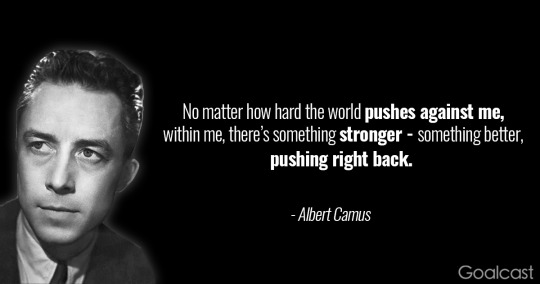
Politics
Camus became political during his student years, joining first the Communist Party and then the Algerian People's Party. As a champion of individual rights, he opposed French colonization and argued for the empowerment of Algerians in politics and labor. Camus would later be associated with the French anarchist movement.
At the beginning of WWII, Camus joined the French Resistance in order to help liberate Paris from the Nazi occupation; he met Jean-Paul Sartre during his period of military service. Like Sartre, Camus wrote and published political commentary on the conflict throughout its duration. In 1945, he was one of the few Allied journalists to condemn the American use of the atomic bomb in Hiroshima.
0 notes
Photo

Albert Camus was a French Algerian writer best known for his absurdist works, including 'The Stranger' and 'The Plague.' He won the Nobel Prize for Literature in 1957. He became known for his political journalism, novels and essays during the 1940s. His best-known works, including The Stranger (1942) and The Plague (1947), are exemplars of absurdism. Camus won the Nobel Prize for Literature in 1957 and died on January 4, 1960, in Burgundy, France.
1 note
·
View note